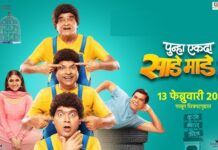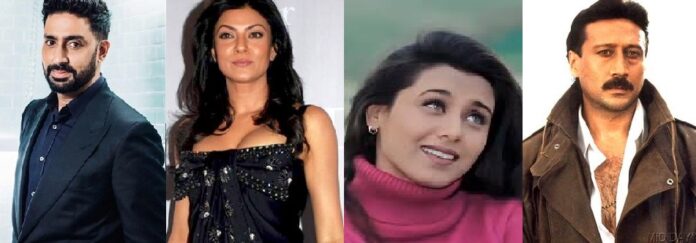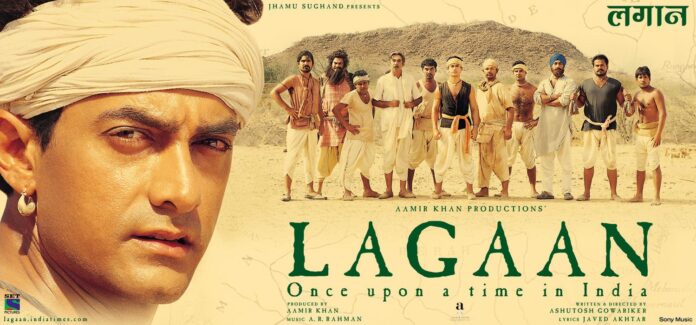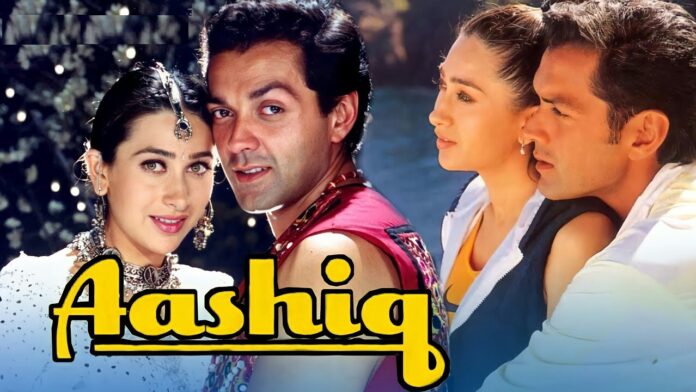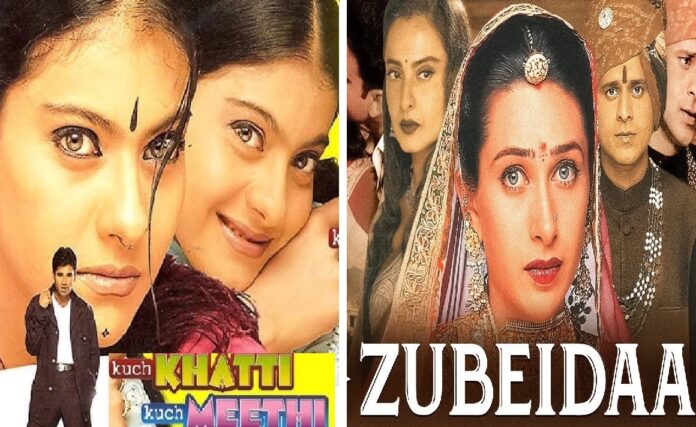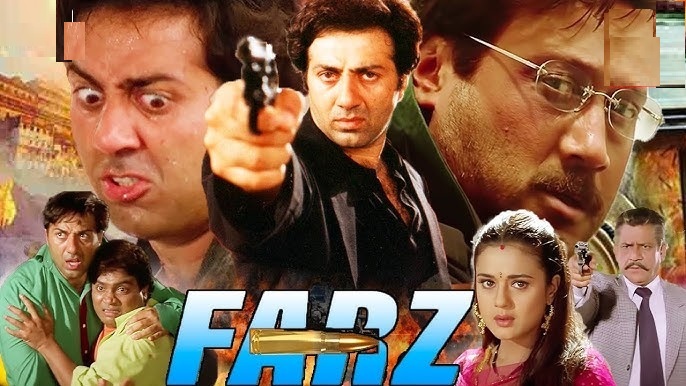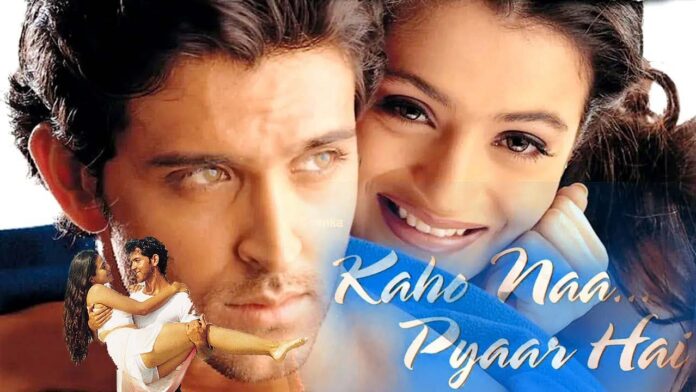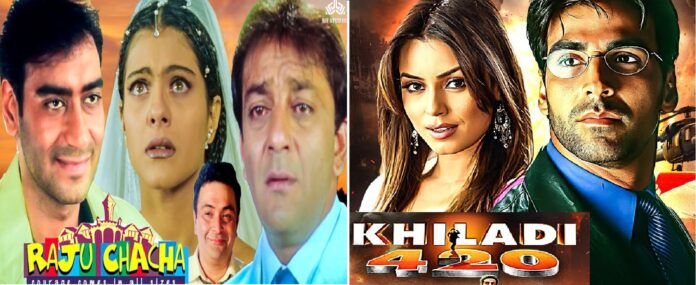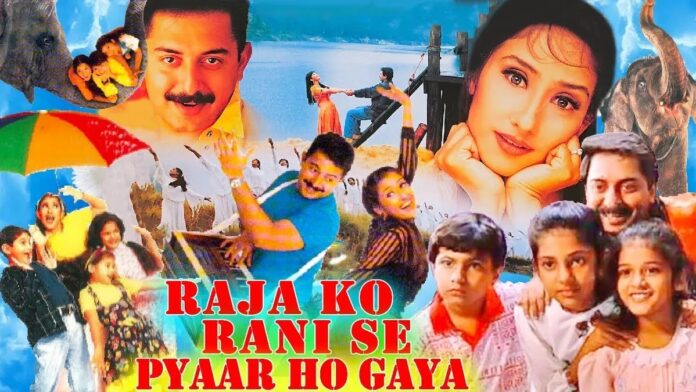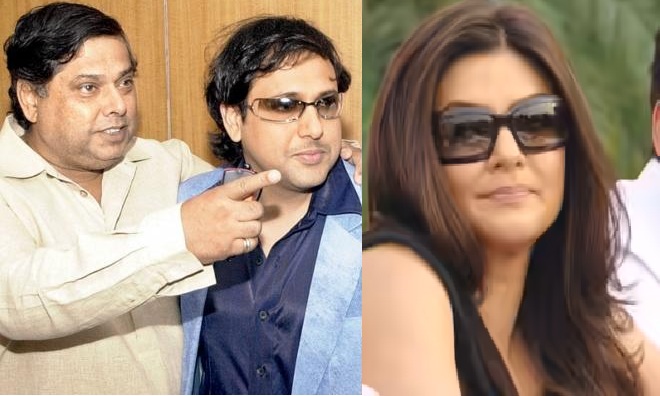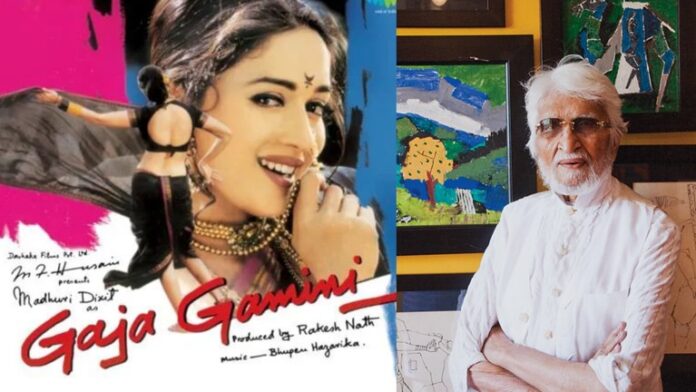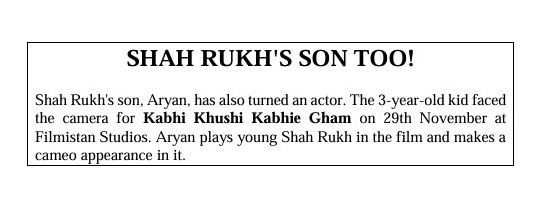SHOOTING COVERAGE
‘BAS ITNA SA KHWAAB HAI…’
A Dream For Its Cast & Crew
A drive towards the dark lane of Sassoon Dock, way past 8 p.m., leads us to Mukesh Mills, Colaba in South Bombay, where the shooting of Rose Movies Combine’s Bas Itna Sa Khwaab Hai… is going on in full swing. Goldie Behl, son of late Ramesh Behl, makes his directorial debut with this film. He is the writer as well as one of the lyricists of the film. A multi-faceted personality, must say. He has roped in his childhood friend, Abhishek Bachchan, to play the lead role, along with Jackie Shroff, Rani Mukerji, Sushmita Sen, Raman Lamba, Anang Desai, Himani Shivpuri, Sanjay Narvekar and Gulshan Grover.
As we reach the location, action scenes of a hundred earlier films shot at Mukesh Mills come to mind, but art director Sabu Cyril seems to have different things in mind. Like, converting the dirty interior of the mill into an amazing blue-coloured dream set. It is taking him more than seven hours to give the finishing touches to the set, we are told. And the result is mind-blowing! It resembles a typical modern-day bar-cum-dancing floor. The floor will have smoke and fire alongside, to “make it look like hell,” informs Goldie Behl.
Goldie and choreographer Ahmed Khan are all set to picturise the pre-climax song of the film on this set. The dancers are dressed in attires of various cartoon figures. Abhishek is required to don the Batman costume. Goldie explains, “To shoot this particular song, I bought a cartoon book to further authenticate my concept.”
Jackie Shroff arrives at 11.30 p.m. to give his shot. As soon as he is on the set, it’s all work and no play. He is required to hold a champagne bottle and pretend to look drunk, standing at the entrance to the dance floor. As soon as the director gives instructions to play the music, Jackie gives his lip sync to Jhoome yeh zameen, jhoome aasman. There are retakes galore, as Jackie struggles with a dance step till finally Ahmed Khan exclaims, “Jaggu-da you’re perfect.” Soon thereafter, Goldie starts to dance. No, not with joy but to explain Jackie his next shot. Ahmed Khan informs, “Goldie, too, is an amazing dancer!”
Abhishek, who is also a part of the song picturisation, is not to be seen still as his shots are to come later. Ditto for Sushmita Sen.
As the clock strikes 12 midnight, it’s time for celebration. For, it’s Jackie’s birthday. Sushmita gives the birthday boy a warm hug and plants a cute kiss on his cheek. Someone on the set asks him his age. He quips, “Sweet sixteen” and adds, “I’m a year younger than Anil Kapoor! Now, keep guessing what Anil’s age is.” He slips down memory lane, recalling the strong bonds he shares with all his co-actors, especially Anil Kapoor, Govinda and Sanjay Dutt. He has always played their elder brother in most of the films and he addresses all of them as “mera bachcha” (as in Misison Kashmir), he adds.
Jackie sounds pretty excited when we ask him about his much-dalayed Grahan. “Most probably, it will be released on 9th or 16th of Feb.,” informs the actor-producer. At which, a smart Alec quips, “Like Sunny Deol’s outburst in Damini, it is tarikh pe tarikh, tarikh pe tarikh…! This grahan doesn’t seem to end!”
Most of the shooting of Bas Itna Sa Khwaab Hai… was done in Varanasi as Abhishek plays a character hailing from the holy town. He is a young and ambitious man who has a lot of aspirations to make it big some day. As nothing works out for him in Varanasi, he decides to come to Bombay, the city of dreams. While trying to settle down in the city, he meets a college girl, played by Rani Mukerji, and he soon falls in love with her. Falling in love proves lucky for him because career-wise, good things start happening. In the meantime, he meets Jackie, a successful media baron whose right-hand lady is Sushmita Sen. Sushmita plays the ideal, strong woman of today, who is ambitious and aggressive but kindhearted. Jackie informs, “Abhishek tries to follow my footsteps. I give him all that he wants — a bungalow, car and money. All this, to tempt him.”
The aftermath, in this particular shot, is a party scene where Abhishek, after getting everything he pines for, realises that wealth is not everything. There are other priorities in life too, he learns. It’s his turbulent state of mind and the transformation he goes through, after this particular song, that forms the climax of the story. Instead of staying with Jackie and Sushmita, he goes back to Rani and a more “peaceful life, away from plain materialistic happiness”. The story sounds familiar? Oh yes, the director seems to be inspired by Raju Ban Gaya Gentleman. He accepts it albelt half-heartedly.
“All the stars of my film have pinned a lot of hope on this film,” says Goldie Behl who hopes to make a mark on debut. Abhishek, too, is looking for the elusive hit in this film. Ahmed Khan will soon be directing his own film, and so, he needs his name to be associated with success.
Goldie is the all-rounder of the film. He is the writer, director and lyricist, too. In which field will he prove a master? Goldie replies, “I want to master each one of them. Bas itna sa khwaab hai, for now!
– SUJATA CHANDA
CBFC TO HIRE PRIVATE DETECTIVES
The Central Board of Film Certification has decided to hire private detectives in the four metropolitan cities to ensure that cinemas there comply fully with the censor guidelines as well as the Cinematograph Act, 1952. The decision has been taken to strengthen the CBFC’s efforts as preventing violations like allowing minors entry for films passed for adults only, failure to prominently display the censor rating on posters outside cinema halls, and adding uncensored portions (‘bits’) in films. The decision has already been approved by the information & broadcasting ministry which has allocated Rs. 45 lakh for its implementation.
KUTCH TRADE IN DOLDRUMS
KEA WRITES TO CM
Film trade in the Gujarat and Saurashtra sub-territories of Bombay has been terribly affected by the earthquake. The situation in the Kutch region of Saurashtra, especially, is extremely grim. All twelve cinemas in the region have closed since 26th January — the day of the quake. Vishwajyoti cinema in Bhachau has been completely destroyed. Others — Vinay in Adipur; Laxmi and Vaishali in Anjar; Sur Mandir, Modern and Ravi in Bhuj; Laxmi in Mundra; Laxmi in Mandvi; Jasmine in Kandla; and Oslo and Shiv in Gandhidham — have also suffered major damage. Efforts are on by the trade to resume business activity in the region. However, the severe nature of the tragedy is making things worse. The Kutch Exhibitors Association has sought help from the state government in getting the cinemas back on their feet.
In a letter addressed to the Gujarat chief minister, the KEA has asked him to take a few relief measures while apprising him of the extent to which the cinemas are damaged. The relief measures sought are:-
i) Entertainment tax paid by the cinemas in the last two years be returned as cash aid to the cinemas;
ii) Exemption from payment of entertainment tax for the next 5 years;
iii) Removal of levies on all equipments for cinema halls; and
iv) Grant of interest-free loans by the government and banks, to cinema halls.
Even if the reliefs are given, it is not known when normalcy for the film trade will return in the forlorn region. The scars left by the quake have been so devastating that it is unlikely that people will have entertainment on their priority list for months to come.
BHARAT SHAH’S BAIL PLEA REJECTED
Film financier Bharat Shah’s bail application was rejected by the special court judge A.P. Bhangale on 7th February.
“Investigations are on and the investigating agencies have reasonable grounds to believe that the accused is a party to the offences charged against him,” the judge said. He also observed, “The accused is an influential person and he can demoralise the investigating agencies. Also, the voice tape confirms that the accused had indeed spoken to Chhota Shakeel, thus abetting the origanised crime syndicate. Hence, anticipatory or premature bail cannot be granted in such cases and I reject the bail application.”
The judge, however, added that Bharat Shah could apply for bail once the chargesheet was filed.
So far, the police has not filed a chargesheet against Shah as it is not mandatory to file one under the Maharashtra Control of Organised Crime Act. The Act provides that the accused can be kept in custody for 90 days without a chargesheet being filed, which period can be further extended.
Bharat Shah, along with his family members, was present in the court when the order was passed. He was represented by his lawyers, including V.R. Manohar, Shiraz Rahimtoola, Vibhav Krishna and Amit Desai.
In a separate development, the Enforcement Directorate on 7th February grilled Shah in regard to his hawala deals. Shah was taken by the ED to its office soon after the MCOCA court rejected his bail plea. ED counsel Arun Gupte sought his custody for four days to allow uninterrupted interrogation. However, the judge directed the ED to question him daily between 11 a.m. and 5 p.m. and produce him before court after the probe ends on each day.
‘CCCC’ RELEASE: NO CLEAR PICTURE AS YET
No concrete solution has still been arrived at by the special court with regard to the release of Chori Chori Chupke Chupke. The court on 8th February, continuing its hearing in the matter, said that it may be possible to release the tainted film through a receiver to be appointed by it (court), from the film industry.
The release plan of the film was thrown in jeopardy when its negatives were seized by the crime branch of the Bombay police soon after the arrest of its producer, Nazim Rizvi, for his alleged underworld nexus. Later, presenter Bharat Shah, too, was arrested under the Maharashtra Control of Organised Crime Act.
During the course of the hearing, when the counsels of Bharart Shah objected to the release of the film by the court, saying that the state did not have the necessary infrastructure to release it, judge A.P. Bhangale wondered aloud whether he could appoint anyone from among the famous personalities in the industry.
The public prosecutor, Rohini Salian, opposing the release tooth and nail, said it could be done only after the police investigations were completed. She also added that there were some doubts on the issue of Overseas territorial rights of CCCC.
Earlier, the court had sought to appoint the chief secretary as court receiver. Bharat Shah’s counsels argued that release of the film through a court receiver would cause prejudice since he would not have the necessary expertise. They also said that an expense of Rs. 2.5 crore needed to be made for the release and questioned who would bear the same. The judge thereupon asked for names of industry persons from among whom a receiver could be appointed.
The judge also heard the film’s Overseas distributors, Eros International, which urged him to have the film released as early as possible as its pirated video cassettes, according to them (Eros), were already in circulation. However, the public prosecutor said, the Overseas territory was under investigation and the conversations intercepted also mentioned the name of Overseas distributor Kishore Lulla of Eros.
Meanwhile, rumours were rife in the industry on 9th February that Mahesh Bhatt had been appointed receiver by the court.
HANIF KADAWALA SHOT DEAD
Producer and India video rights distributor Hanif Kadawala (of the Hanif-Samir duo) was shot dead on 7th February at Bandra, Bombay. Three armed men are reported to have fired at Hanif from point-blank range. He was rushed to the nearby Bhabha Hospital but he was declared dead on arrival. The shootout is believed by the police to be the handiwork of underworld don Chhota Rajan.
Hanif, along with Samir Hingora, had produced Baap Numbri Beta Dus Numbri, Dil Hi To Hai and Sanam. His Singer is yet to be released.
Hanif and Samir were accused in the 1993 Bombay bomb blasts case. Hanif was currently out on bail alongwith Samir.
EXHIBITOR-MEMBERS OF CCCA TO DONATE FOR GUJARAT QUAKE VICTIMS
The Central Circuit Cine Association (CCCA), at a meeting of its executive committee held on 3rd February in Indore under the presidentship of Santosh Singh Jain, passed a resolution advising its member-cinema houses to donate the net collections of 15th February to the chief minister’s relief fund in the respective state of the central circuit. The Central Circuit comprises Madhya Pradesh, Chhattisgarh, Rajasthan and the Vidarbha and Khandesh regions of Maharashtra. The net collections of the day will go towards the relief and rehabilitation of victims of the earthquake in Gujarat.
The CCCA has advised its exhibitor-members to make the payment by bank draft in favour of the chief minister’s relief fund. The bank draft is to be submitted to the collector of the district with an intimation to the chief minister of the concerned state and the CCCA.
SEVEN ARRESTED IN RAIDS ON NAGPUR VIDEO PARLOURS
The crime branch of Nagpur police recently swooped on four video parlours in Nagpur and seized thousands of CDs and video cassettes of Hindi and English films, including cassettes of 16 hard-porn films, along with television sets and video cassette recorders. The properties seized are estimated to be worth Rs. 7 lakh. Seven persons were arrested. Cases were registered against them under sec. 292 read with sec. 63 of the Copyright Act. Those arrested include Radha Kishan Punyani, Ajay Punyani, Manoj Thakkar, Jugal Kumar Agrawal and Praveen Rattewar. The raids were carried out on a tip-off by K.K. Sawhney, convenor of Cine Exhibitors’ Association, Nagpur.
YOU ASKED IT
Many of the titles of forthcoming films are being used by makers of television serials. This robs a new film of its title value. These days, when finding a good and suitable title is so difficult, what is the way out to avoid this unethical ‘title piracy’?
– No way out, till film and TV producers sit on the issue together.
How can one determine good cinematography?
– The basic thing is that the visuals should be pleasing to the eyes.
Which was the first Hindi film to celebrate silver jubilee?
– AMRIT MANTHAN, which was released in 1934. It was produced by Prabhat Talkies and directed by V. Shantaram.
Slow Flow Deals A Bodyblow
So slow is the flow of forthcoming releases that even films, which would not have generated any excitement among exhibitors in the ordinary course, are today bringing smiles on their lips just and only just with the sealing of their release dates. One postponement, and cinemas across the nation are in a mourning mood. One confirmation of a star-cast release, and they heave sighs of relief.
A Delhi-U.P. distributor, who was recently in Bombay to attend a filmland wedding, returned to Delhi with ‘inside information’ that at least three films, which were scheduled for early release, had been postponed. That was enough to spread panic to last a couple of days in the trade in the capital city. Things have come to such a pass that release dates are now being ‘chased’ by exhibitors like mirages in a desert by the thirsty.
To add to the woes of the already suffering tribe of exhibitors is the poor quality of films released of late. No film, released in the last 15 weeks, has been able to sustain at the box-office. Resultantly, those who are benefitting from the present scenario are the distributors. They have been able to screen their films at terms which are clearly disproportionately advantageous to them as against the cinemas, the latter being forced to pay through their nose, because the only other option available to them is to remain closed.
Which brings us to the point of weekend cinema, as it happens in Hollywood. Will the year 2001 be witness to cinemas in India, too, remaining shut on weekdays (maybe, for all shows or for the daytime shows) and conducting shows on weekends only? It is quite possible that some exhibitors may find it more cost-effective to keep cinemas closed for some days in the week than to run them every day, as at present.
Some people think, smaller films are the answer to this problem. Small films without big stars will be made faster, they argue, and there’ll be many more producers willing to risk limited amounts of money on such projects, they feel. But it hardly seems likely that smaller films will be able to ease the situation. For, will the small films be able to bear the burden of the prohibitively high admission rates? The answer is “no”.
The question which then arises is: What is the solution?
Any answer? They’d be more than welcome from you.
– Komal Nahta
3-E
Education-Entertainment-Enlightenment
Small Producer, Big Music Company, Bigger Ghotala
The games some people play can leave you astounded. A leading music company is making a fortune by selling the music cassettes of a recently released regional language (non-Hindi) film, but it has not yet paid a single naya paisa to its small and new producer. The gullible producer signed the agreement with the music company, for sale of his music rights but the signed agreement was sent outstation by the company under the pretext of getting it signed by its managing director. It is more than three months now but the agreement still eludes the simpleton producer. So also the cheque which is equally elusive. So while the producer hasn’t got so much as a signing amount, the music company is filling its coffers because the film’s music has become a rage. It is also alleged that soon after the music became a craze, the company’s top officers hiked the price of the cassette and, simultaneously, flooded the market with pirated copies of the film’s audio cassettes. Resultantly, even the company is now losing money as its officers continue to earn by dubious means.
Celebrating A Flop!
We’ve heard of filmmakers celebrating the success of their film, but celebrating a flop?!? Well, that’s what the director of a recent debacle did — he threw a party. The director hosted a small party for close friends on the day his latest film hit the screens recently. Looking to the encouraging collections on the opening day, the over-enthusiastic director lost no time in arranging an impromptu party that very day to celebrate, what he thought was, the film’s success. But on the very next day, the collections came crashing down. It was then that realisation dawned upon the director that the good collections on the opening day had nothing to do with his film but everything to do with the public holiday on Friday.
So ultimately, it turned out to be the celebration of a flop.
A ‘Site’ To Behold!
Poonam Dhillon launched her personal website, <www.poonamdhillon.com> on 7th February in Bombay. The website highlights the early days — in Chandigarh — of Poonam who went on to win a beauty crown before being launched by Yash Chopra in Noorie; a quick look into her personal life; her family and friends; the Vanity make-up van which she pioneered in the Bombay film industry; and some unpublished photographs of herself. The website also offers an array of greeting cards, free medical helpline backed by Dr. Rishma Pai and Dr. Harishi Pai (Poonam’s sister and brother-in-law), a section for kids’ entertainment, recipes, fashion, charity, an Agony Aunt section etc. Poonam is also writing a book which she hopes to release online on her site.
The party to celebrate the foray of Poonam into the World Wide Web was a well-attended affair. The site was launched by none other than Yash Chopra, the man who also launched Poonam herself.
Tracinema: From TV To Cinema
Tracinema, one of the bigger television software production companies, has branched out into film production. Raman Kumar and Vinta Nanda, whose Tara on Zee TV was, for several years, the longest-running soap, launched their first film, Aur Phirr…., this week with a song recording at Spectral Harmony.
Raman, besides producing the film, is also directing it from a story by partner Vinta Nanda. Coming back to the song, it was Jaspinder Narula who lent her voice to it under the baton of music director Aadesh Shrivastava, with percussionist Sivamani on the drums. The cast of Aur Phirr…. is being finalised.
One Title, Two Claimants
Even before the debut film of hero-producer-director Sohail Khan (brother of Salman Khan) and heroine Sameera Reddy has gone before the cameras, it is shrouded in a controversy over its title. While producers Bunty Walia and Sohail Khan claim that Maine Dil Tujhko Diya is the title of the film, producer and Bengal distributor Sanjay Roy has the same title registered in his favour with the title registration committee of the IMPPA. “Maine title tujhko nahin diya,” seems to be Sanjay’s refrain to Walia and Sohail these days. Why, he has already taken up the matter with the IMPPA. On the other hand, the producer-duo seems to be quite unperturbed by the claim of Sanjay Roy. In the spirit of their previous films, they seem to be telling Roy, “Hello brother, title liya toh darna kya!”
Incidentally, Sohail-Walia’s film is to be launched on Valentine’s Day (February 14).



